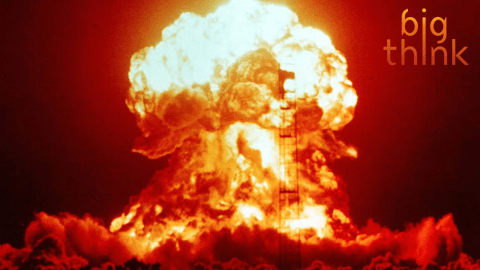Domestic Nukes: An Unprecedented Disaster Waiting to Happen, with Eric Schlosser

Somehow and someway the United States managed to make it to the year 2014 without getting itself blown up. Despite knuckle-gripping tension and mass nuclear proliferation during the Cold War, not a single detonation has caused mass civilian casualties since 1945. According to investigative journalist Eric Schlosser, such good fortune is nothing more than blind luck. Schlosser is best known as author of best-selling books Fast Food Nation and Reefer Madness. His latest, Command and Control, analyzes nuclear weapons and the illusion of their safety. In his recent Big Think interview, Schlosser explains why the American public has no reason to feel safe about how the U.S. manages its nuclear arsenal:
Schlosser's book, as well as this interview, focuses in particular on a frightening incident that occurred thirty-four years ago in the town of Damascus, Arkansas. Damascus was home to a massive silo housing a ten-story Titan II missile. Atop this missile was the most powerful nuclear warhead the United States ever built. Tread carefully, right?
On September 18, 1980, an airman conducting routine maintenance dropped a socket that fell 80 feet (24 m) down the silo before tearing a hole in the missile's protective metal skin. This caused a major rocket fuel leak. Rocket fuel is highly flammable. It's also highly explosive. And thousands of gallons of the stuff was suddenly spilling out into a silo containing an explosive device capable of leveling much of Arkansas.
The rocket exploded within 24 hours (killing one, injuring dozens) but since Arkansas is still on the map you can probably guess that the warhead was kept from detonating. Still, as Schlosser explains, hearing this story for the first time shocked him. How could we have come so close to such a disaster? When he began researching further into Damascus, Schlosser found that it wasn't nearly as isolated an incident as he initially suspected:
"The more I learned, the more amazed I was by how many other accidents there had been and how many times the United States came close to losing our own cities as a result of accidents with our own nuclear weapons. So that led me to interview bomber crew members, missile crew members, nuclear weapon designers, nuclear weapon repairmen and to do a lot of searches through the Freedom of Information Act for top secret documents about these nuclear accidents and about safety problems with our weapons."
Schlosser's research eventually led to the writing of Command and Control. His findings revealed that the U.S. government routinely lied about, covered up, and underreported accidents involving nuclear devices:
"There was this effort to keep away from the American people the truth about the dangers and the risks of our nuclear arsenal because there was a concern that if the American people really understood some of the risks they wouldn’t support our nuclear weapons policies."
Now, in the 21st century, Schlosser wants citizens to carry more sway in the national discussion about these weapons. A nuclear detonation on domestic soil would wreak chaos on a scale dwarfing any known natural disaster. With stakes this high and the Cold War long over, is it not time to do away with all the government secrecy?
"All manmade things are fallible and they’re going to be fallible because we’re fallible. It’s impossible for human beings to create anything that’s perfect and that will never go wrong. So the question is how much risk are you willing to accept. And those decisions weren’t made by the American people debating well how much risk are we willing to accept. They were made by Pentagon policy makers acting largely in secret, a small number of people. Eventually they came to the conclusion that the risk of an accidental detonation from a nuclear weapon during an accident should be one in a million. And that’s what they decided was an acceptable risk. Now one in a million sounds like a very unlikely occurrence but one in a million things happen all the time. People who buy lottery tickets and win the lottery are defying odds much greater than one in a million."
At this rate, Schlosser believes a nuclear disaster is bound to happen sometime. It may be years from now; it may be tomorrow. What is for sure is that our illusion of safety from nuclear threat is simply that -- an illusion. And the greatest threat of a detonation on American soil comes not from Russia or some other outside entity. It comes from within. After all, we're only ever one lost socket away from catastrophe.
"When nuclear weapons were first being invented this was such a new technology and such a new science they really had no idea what some of the safety implications would be. And one of the themes of my book is that this technology has always from the very beginning been on the verge of slipping out of control... And in the year 2014 there are still all kinds of uncertainties about our ability to control this technology and to be able to prevent catastrophic mistakes and accidents if something goes wrong."





